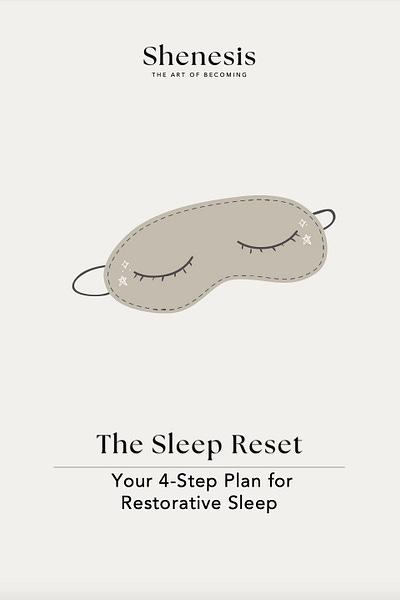The Night Owl’s Dilemma: Is Your Sleep Schedule Making You Depressed?
Why staying up late could be working against you and how to reset your body clock for better mental resilience
I spent my entire thirties navigating the fog of depression, with Lexapro, Noctamid, and overeating as my crutches. Fun times.
During those years, a pattern emerged: my worst episodes always coincided with erratic sleep, late nights, and a complete disregard for my circadian rhythm.
I used to be a night owl.
Back then, I saw it as a quirk, something that set me apart from those in bed by 10 PM and up at 6 AM. Yes, I know.
Creativity struck at 10 PM, and productivity seemed to peak just as the world was winding down. But the truth is, I hated my life back then. Staying up late wasn’t about seizing the night. It was about avoiding the next day, a form of so-called productive procrastination.
But was my natural tendency to stay up late working against me? Research suggests it was.
What does this mean? It means that your chronotype1 may affect depression risks, with evening types being more vulnerable.

Why Night Owls Face Higher Risks
Circadian rhythm, the body's internal clock that governs sleep-wake cycles, doesn’t just dictate when we feel sleepy. It influences mood, metabolism, hormone production, and even cognitive function. When that rhythm is misaligned with natural light-dark cycles, it creates biological stress.
Studies show that night owls have a 30-40% higher risk of depression compared to early birds (Murray et al., 20192). This increased risk isn’t just about sleep deprivation. It’s also about how the brain processes emotions and stress when our biological clock is out of sync.
Key factors contributing to the night owl-depression link:
Reduced exposure to morning light: Natural light in the morning regulates serotonin levels, stabilising mood. If you go to bed late, I mean way past midnight here, chances are you’ll wake later in the day, thus probably missing the window when morning light is the most efficient at regulating your serotonin levels.
Delayed melatonin release: Night owls have a delayed internal clock, causing their melatonin levels to rise later in the evening. This makes it harder for them to unwind, leading to increased alertness at night and difficulty falling asleep or waking up early.
Disrupted sleep architecture: Deep, restorative sleep is often disrupted by irregular sleep patterns. A consistent schedule allows the body to move naturally through all sleep stages, while irregularity interferes with this process, leading to fewer restorative sleep phases. So even if you sleep for let’s say, seven hours, you might still wake up the next day feeling less than refreshed.
Social jet lag: Refers to the mismatch between our biological clock and social obligations, like work or school schedules or social events. It happens when we keep different sleep patterns on weekdays versus weekends, disrupting our circadian rhythm and leading to fatigue, poor mood, and long-term health risks.
The Long-Term Risks: Brain Health, Ageing, and Dementia
For those who have experienced depression, been on antidepressants, and lived with disrupted circadian rhythms, the long-term impact on brain health is concerning:
Depression as a risk factor for dementia: Research suggests that experiencing depression, especially recurrent episodes, can increase dementia risk by up to 20% (Diniz et al., 20133). Chronic stress and inflammation linked to depression may accelerate cognitive decline.
Antidepressants and neuroplasticity: While SSRIs like Lexapro can help rebuild neural pathways, prolonged use without lifestyle adjustments might not address underlying circadian misalignment.
Sleep and cognitive resilience: Poor sleep quality, common among night owls, is one of the strongest modifiable risk factors for Alzheimer’s disease (Bubu et al., 20174).
Reset Your Circadian Rhythm for Mental Resilience
If you’re a night owl struggling with mood, energy, or brain fog, shifting your circadian habits can be a powerful intervention.
Here’s how:
1. Move Your Bedtime Back (Gradually)
Adjust in 15-30 minute increments over a few weeks instead of forcing an abrupt change.
Aim for at least 7-8 hours of sleep within a consistent window.
2. Get Morning Light Every Day
Step outside within an hour of waking for at least 10 minutes.
If sunlight isn’t available, consider a 10,000-lux light therapy lamp.
3. Reduce Blue Light at Night
Avoid screens 60-90 minutes before bed.
Use warm, dim lighting in the evening.
Consider blue-light-blocking glasses if screens are unavoidable.
4. Align Eating and Movement With Your Rhythm
Eat protein-rich breakfasts to support dopamine production.
Avoid late-night heavy meals, alcohol, and caffeine, which disrupt sleep.
Exercise in the morning or early afternoon to reinforce wakefulness.
5. Prioritise Sleep as a Brain Health Investment
Consistent sleep schedules reinforce circadian alignment.
Sleep tracking can provide insights into patterns and disruptions5.
Deep sleep is when the brain clears toxins and consolidates memory, protecting against long-term cognitive decline.
My Own Shift: From Night Owl to Early Bird
For years, I resisted the idea of waking up early. It felt unnatural. But when I started prioritising morning light, consistent sleep, and earlier bedtimes, my mood, energy, and mental clarity shifted.
It wasn’t about forcing myself into an early bird mould. It was about working with my biology instead of against it.
If you’ve struggled with depression, sleep issues, or cognitive fog, your circadian rhythm may be the missing piece.
The good news?
As always, small, consistent changes can create profound shifts.
Related post:
Poor Sleep? Poor You! Lack of Sleep Ages You Faster than Time Itself
Fix sleep, and everything else, your energy, focus, cravings, and motivation, begins to fall into place. Ignore it, and you’re fighting an uphill battle in every area of your health. Download my free 4-Step Sleep Reset Plan and fix your sleep for good.
If you liked this post, support Shenmag:
→ If this sparked something in you, give this post a like.
→ If you have a thought to share or just want to chime in, leave a comment.
→ And if it made you rethink something and you want to spread the word, restack.
Shenmag is more than a newsletter. It’s a conversation about ageing on our own terms. Every interaction helps it grow. Let’s rethink midlife. Redefine ageing. And rewrite what comes next.
Chronotype refers to an individual's natural inclination or preference for being active and alert at certain times of the day, essentially their "morningness" or "eveningness". It's a behavioural manifestation of the body's internal circadian rhythm, which governs sleep-wake cycles and other physiological functions. Learn more with the Sleep Foundation’s Chronotypes: Definition, Types, & Effect on Sleep.
Sleep regularity is associated with sleep-wake and circadian timing, and mediates daytime function in Delayed Sleep-Wake Phase Disorder, Murray, J., Sleep Medicine, 2019.
Late-life depression and risk of vascular dementia and Alzheimer's disease: systematic review and meta-analysis of community-based cohort studies, Diniz et al., The British Journal of Psychiatry, 2013.
Sleep, Cognitive impairment, and Alzheimer's disease: A Systematic Review and Meta-Analysis, Bubu et al., Sleep Research Society, 2017.
Relying on sleep tracking devices can sometimes create more stress than benefit. While these devices provide valuable insights into our sleep patterns, they can also trigger anxiety, especially if the data doesn’t align with our expectations. So, please, don’t obsess over achieving perfect sleep statistics! Read more about this topic here: Is Your Sleep Tracker Disrupting Your Sleep?






